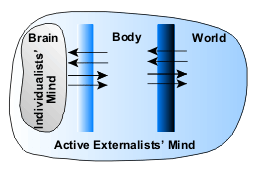
 |
 |
For printing, download pdf version.
![]()
Where is the problem of “Where is the mind?”?
cgg unam.mx
unam.mx
We propose that the discussions about “where the mind is” depend directly on the
metaphysical preconception and definition of “mind”. If we see the mind from one perspective
(individualist), it will be only in the brain, and if we see it from another (active externalist), it will
be embedded in the body and extended into the world. The “whereabouts” of the mind depends
on our <concept|definition>
![]() of mind. Therefore, we should not ask if the mind is somewhere,
but if it is somehow.
of mind. Therefore, we should not ask if the mind is somewhere,
but if it is somehow.
Many people, such as Clark (1997) and Chalmers (1998), Haugeland (1995), Maturana and Varela (1987), Chiel and Beer (1997), have defended that the mind and cognition is not only in the brain, but it extends to the body and the environment. They can be considered “active externalists”. On the other hand, we could name “individualists”, such as Butler (1998), Adams and Aizawa (2001), who have argued that the mind is only in the brain, even when it is strongly related with the body and environment. There is no discussion about the relevance of studying the brain, body, and world in order to understand the mind. The disagreement lies only on <where|what> is the mind. But they all think that they speak about the same thing, just because they use the same word to describe it. When we look more closely, they really mean different things with their use of the word “mind”.

For example, we can all agree that it is much harder (and sometimes impossible) to do large multiplications without the aid of pencil and paper. But individualists would see the paper and pencil, the writing hand and perceiving eye, as tools of the mind, but not part of a cognitive process. On the other hand, active externalists see the processes so coupled, that they define them as part of the mind.
At the bottom of the discussion, what lies is just a semantic problem: it depends on which meaning we give to “mind”, that will lead us to consider the body and the world as part of it or not. If we take a <restrictive|limited> definition of mind, then we would agree with the individualists, considering that the mind is composed only of “rational thoughts”. If we take a broader notion of mind, considering behaviour and perception as mental, we would give the reason to active externalists.
So which one is the “correct” definition? Well, it all depends on what for we are using it for. In different cases, one should be more appropriate than the other (or even another definition of mind). We cannot say that a definition is “absolutely better” than other. We could say that one is less incomplete than another, if the first contains the second. But what if we are interested only in a specific situation? The less incomplete definition could bring too much generality and undesired noise. We can see, that the value of a definition depends directly on the context where it is used.
This does not mean that all definitions are valid since we can find a context where they
can be valid
![]() , and therefore we are not falling into a “radical relativism”. The specific conditions
of a problem, and our experience of it, will determine which contexts are useful and which are
not. But the fact that for different conditions we can have different definitions, leads us to be
alert of the context whenever we are using a definition. Also, while arguing about a definition,
we should be aware of the context(s) in which the argument takes place, since it is very common
(as with the <“mind” case>^2
, and therefore we are not falling into a “radical relativism”. The specific conditions
of a problem, and our experience of it, will determine which contexts are useful and which are
not. But the fact that for different conditions we can have different definitions, leads us to be
alert of the context whenever we are using a definition. Also, while arguing about a definition,
we should be aware of the context(s) in which the argument takes place, since it is very common
(as with the <“mind” case>^2
![]() ) that the argument precisely takes place because the people are
not aware of the differences of context, and they assume that everyone is speaking about “the
same thing”, when their context makes things completely different. Therefore, they will be
arguing about different things, and of course the ideas of the arguers will not be congruent with
the others’ context. This makes that the argument will not be able to have a conclusion more
satisfactory than a sophism.
) that the argument precisely takes place because the people are
not aware of the differences of context, and they assume that everyone is speaking about “the
same thing”, when their context makes things completely different. Therefore, they will be
arguing about different things, and of course the ideas of the arguers will not be congruent with
the others’ context. This makes that the argument will not be able to have a conclusion more
satisfactory than a sophism.
We believe that by adopting a contextual approach, many “problems” in philosophy stop being problems, because we can see them from different perspectives (contexts) at once, without arguing without a sense of <location|context>. In this spirit, the “problem” of “where the mind is” is not a problem at all. Enlarging our context, we can accept both notions of mind, each one useful for their particular subcontext (individualist or active externalist). So, if someone would ask “where is the mind?” we would answer: “it depends on the context you are interested in”. If they are confused and demand “just tell me if it extends to the body and world”, we would say “yes AND no... it depends on the context”.
Adams, F. and K. Aizawa (2001). The Bounds of Cognition. Philosophical Psychology 14 (1), pp. 43-64.
Butler, K. L. (1998). Cognitive Explanations. In Butler, K., Internal Affairs: Making Room for Psychosemantic Internalism. Kluwer.
Chiel, H. J. and R. D. Beer (1997). The brain has a body: adaptive behavior emerges from interactions of nervous system, body, and environment. Trends in Neuroscience 20, pp. 553-557.
Clark, A. (1997). Being There: Putting Brain, Body, and World Together Again. MIT Press. Cambridge, Massachusetts.
Clark, A. and D. Chalmers (1998). The Extended Mind. Analysis 58 (1), pp. 7-19.
Gershenson, C. (2001). Comments to Neutrosophy. In Smarandache, F. (Ed.) Proceedings of the First International Conference on Neutrosophy, Neutrosophic Logic, Set, Probability and Statistics, University of New Mexico. Gallup, NM.
Gershenson, C. (2002). Complex Philosophy. Proceedings of the 1st Biennial Seminar on Philosophical, Methodological & Epistemological Implications of Complexity Theory. La Habana, Cuba.
Haugeland, J. (1995). Mind Embodied and Embedded. Acta Philosophica Fennica, 58, pp. 233-267
Maturana, H. R. and F. J. Varela (1987). The Tree of Knowledge: The Biological Roots of Human Understanding. Shambhala.

| Back to main |